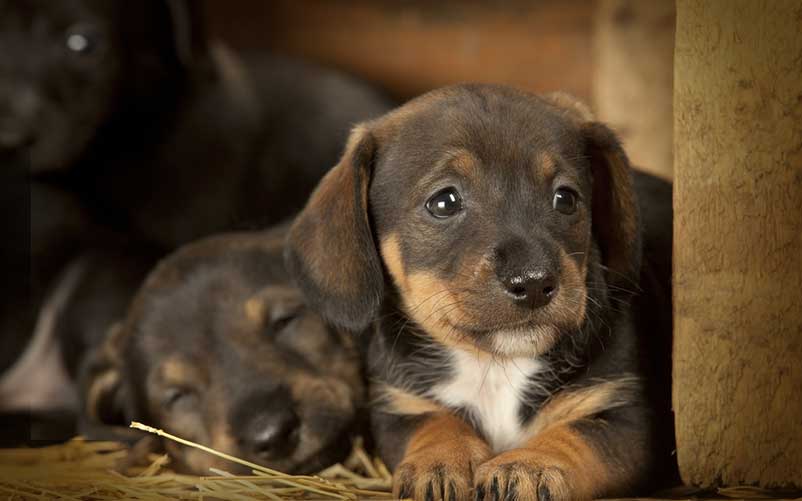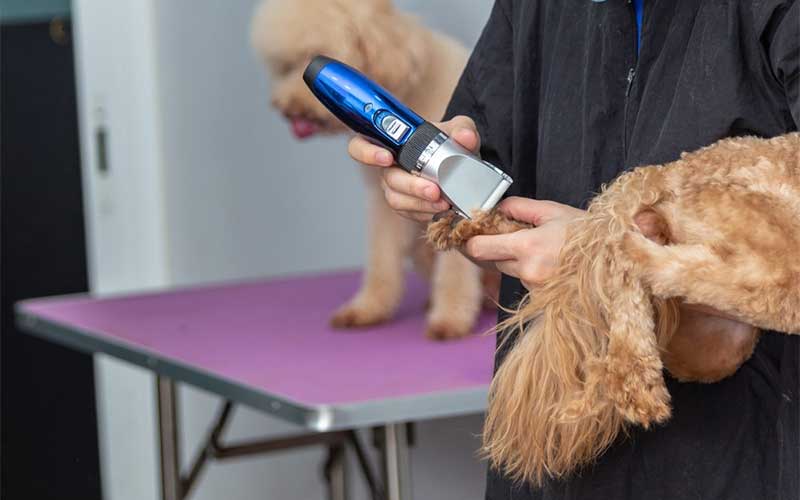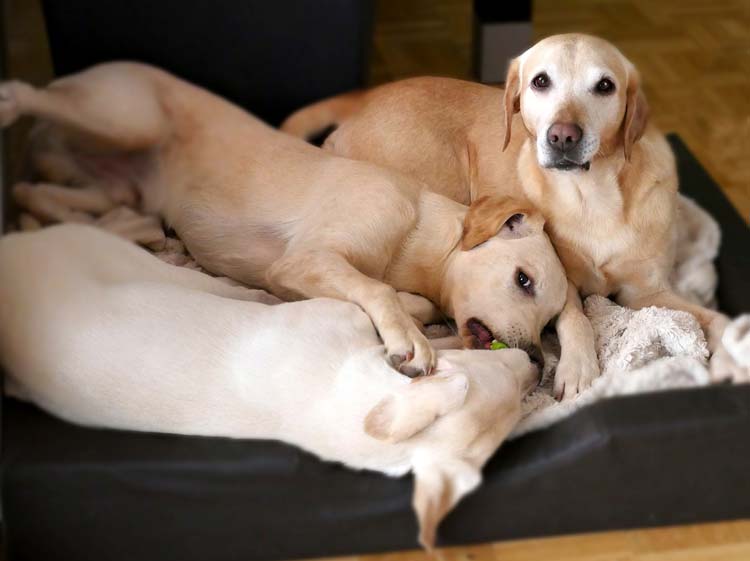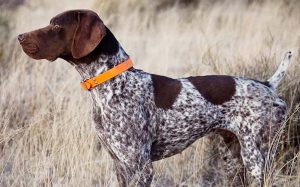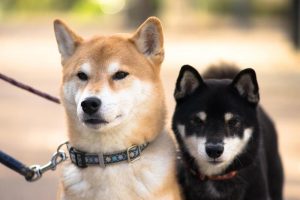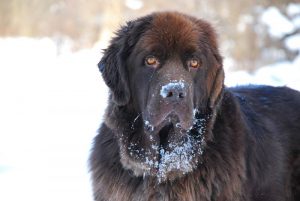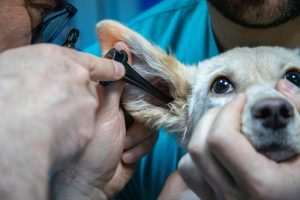As a working breed, the Bernese Mountain Dog is one of the most prized home companions out there due to being a large yet lovable and loyal breed. They are also known for their intelligence, which makes them capable of performing various tasks not just at home, but also in the field.
However, to successfully raise a Bernese Mountain Dog, you have to feed your puppy right. How much do you need to feed your Bernese Mountain Dog? We have some answers in this article to help you raise your soon-to-be big buddy healthily and happily.
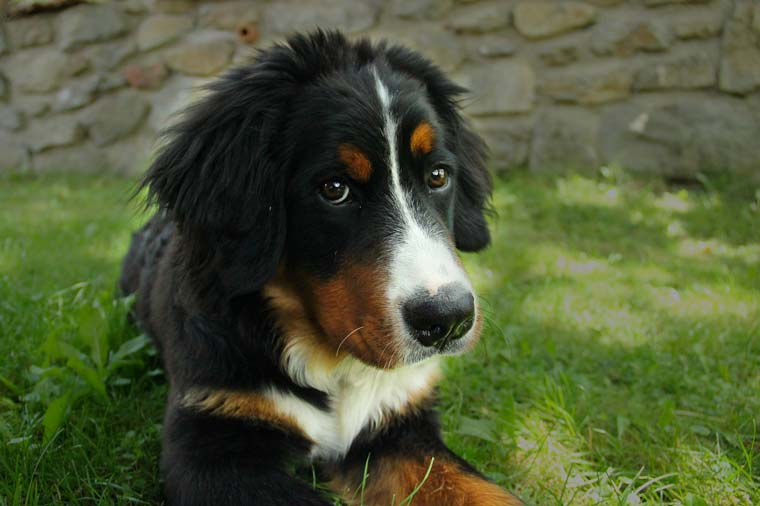
Like most pedigree breeds, the Bernese Mountain Dog is also susceptible to various health conditions, which also, unfortunately, shortens its average lifespan. However, with proper feeding and a healthy lifestyle, your dog could live past its expected senior stages!
See also:
Your Bernie could grow into a healthy and strong dog that will become your companion for life if you take care of them properly. Since they were meant to be a working breed, the Bernese Mountain Dog should have a specific diet during their puppy years to get all the nutrients they need when they turn into adults.
Page Contents
How much to feed a Bernese Mountain Dog puppy?
A Bernese Mountain Dog puppy should receive somewhere between 3/4 cup and 1/2 cup for each meal that you give them. They should receive this food about 3 times a day depending on the circumstances. After all, this will still depend on their life stages, which we will discuss below.
The Bernese Mountain Dog is a breed that’s prone to bloating and various other stomach upsets, which is why they need to eat more often but with little amounts. Taking in a lot of food in one go will cause them to get bloated and possibly vomit their food.
It’s interesting to know that despite being a large breed, the Bernese Mountain Dog puppy naturally has a small stomach. That’s why you need to be considerate in the number of feedings and don’t feed them all in one go.
A Bernese Mountain Dog puppy with a higher metabolism rate and a much bigger weight at birth might be recommended by your vet with more cups per serving and more meals per day. You can ask your veterinarian about this, just to be sure.
Feeding Chart
To help you raise your Bernese Mountain Dog puppy properly, here is a feeding chart depending on their stage of life, which we will get into detail much later:
| Life stage | Amount of servings per day | Type of food |
| Below 16 weeks old | Free feeding | Weaning food, such as wet and kibble mix |
| 4 months old | 3 times a day | Homemade, raw, wet, dry food |
| 6 months old | 2 times a day, preferably morning and evening | Homemade, raw, wet, dry food |
Below 16 weeks old
During your Bernese Mountain Dog puppy’s first few weeks, they will usually just depend on their mother’s milk. However, once they are 16 weeks old, you can start the transition from liquid to solid food. Your puppies should have access to their food as much as possible so they can be trained to liking it.
Weaning is always a difficult process at first because it takes a lot of patience. Sometimes, your Bernese Mountain Dog puppy might not pay attention because they might not like the food or are scared of it. However, you can add a few flavorings just to get them attracted to it.
Then, you can slowly transition to solid food going in partitions of 75% liquid food and 25% solid food. Slowly decrease the amount of liquid in your Bernese Mountain Dog puppy’s diet to begin the weaning process.
However, if you just adopted or got your Bernese Mountain Dog pup from a shelter or breeder, you may want to ask what puppy food brand was used for weaning them or training them. This will help a lot in preventing food allergies from happening.
As with the food weaning process, gradually introduce any new food for your Bernese Mountain Dog puppy, in case you don’t know what food was used in weaning them. This is the case for people who just rescued their puppy from the streets with no trace of previous owners.
Picky eaters will also be difficult to feed, so you may want to try combining both wet and dry food, as well as a bit of treat or raw dishes along the way. Check with your vet if your Bernese Mountain Dog puppy is okay to be fed with certain wet market food.
4 months old
At 4 months old, the Bernese Mountain Dog puppy can be fed up to 3 times a day. Starting a scheduling process will help your pup not to get bloated by eating too much. When you begin a schedule for your pup, they won’t excessively eat and they will also have a controlled diet.
A controlled diet plays an important factor in keeping their physical health in tip-top shape. No one wants an obese and unhealthy dog so it’s important to keep your Bernese Mountain Dog puppy’s diet in control while they are still young.
The puppy years of a Bernese Mountain Dog will be the time that they’re inclined to eat a lot. That’s why being feed only to a specific schedule of 3 times a day (with minimal food amounts mentioned above) will limit their appetite so they won’t be voracious eaters that could harm their physical health.
6 months old
Do you have an active Bernese Mountain Dog puppy? It’s time to feed them more responsibly by scheduling their meals away from their physical activity. That’s because they might get tummy aches if you strain their stomach to have short periods between playtime and chow time.
The Bernese Mountain Dog that’s 6 months old and above is best to be only fed twice a day. After all, it is a large breed and by this time, they might have already adjusted to having a slightly bigger stomach that’s less prone to bloating and other issues. Still, don’t feed them too much and don’t feed them only once!
We recommend feeding your Bernese Mountain Dog puppy two meals: morning and evening. Then, you can schedule their physical activities in the afternoon. It’s all in the balancing of time and food intake.
Growth Chart
So, how do you know if your Bernese Mountain Dog puppy is at the right weight? You can use our handy chart below as a reference (but we still want you to take your pup to the vet, just to be sure) to know if your pup is underweight or overweight.
The Bernie has a rapid growth stage during their early stages due to being a large breed. Different life stages of a Bernese Mountain Dog will mean different weight brackets, such as the following:
| Age in months | Male Weight | Female Weight |
|---|---|---|
| 1 month | 9 lbs (4 kg) | 8 lbs (3.5 kg) |
| 2 months | 20 lbs (9 kg) | 18 lbs (8 kg) |
| 3 months | 35 lbs (16 kg) | 30 lbs (14 kg) |
| 4 months | 50 lbs (23 kg) | 44 lbs (20 kg) |
| 5 months | 63 lbs (28 kg) | 54 lbs (24 kg) |
| 6 months | 74 lbs (33 kg) | 63 lbs (29 kg) |
| 8 months | 90 lbs (41 kg) | 75 lbs (34 kg) |
| 10 months | 97 lbs (44 kg) | 80 lbs (36 kg) |
| 12 months | 100 lbs (45 kg) | 82 lbs (37 kg) |
| 15 months | 103 lbs (47 kg) | 85 lbs (38 kg) |
| 24 months | 105 lbs (48 kg) | 85 lbs (38 kg) |
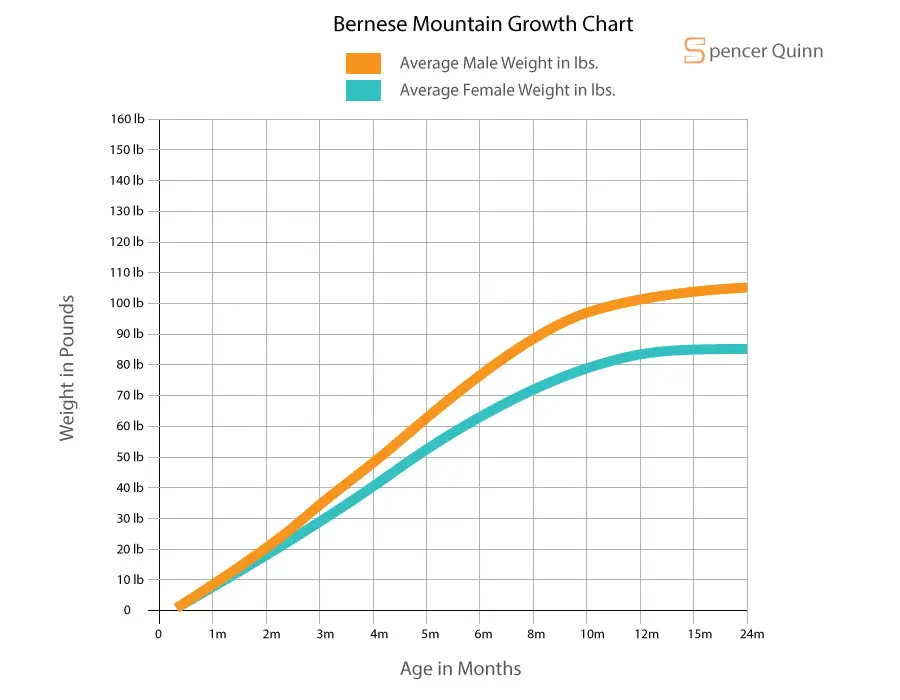
Recommended Food for a Bernese Mountain Dog puppy
A Bernese Mountain Dog pup is a working breed by nature. You can feed them various food types as advised by your vet. Here are some of the common ingredients and nutrients in food that you can feed to your Bernese Mountain Dog puppy:
1. Protein
As we mentioned above, the Bernese Mountain Dog is a working and sporty breed. That’s why they need all the protein that they can get. Examples of protein sources are:
- chicken
- beef
- fish
- pork
- lamb and other meat
As long as the Bernese Mountain Dog puppy food is sustainably sourced without by-products, it is a good choice for your pup, especially if they have food allergies. As with all domesticated dogs, your Bernese Mountain Dog puppy will eat like you (they are omnivores) so there’s no need for a vegan diet unless advised by your vet.
Although some vegan pet foods do have protein sources, most vets agree that it is not sufficient for a Bernese Mountain Dog puppy due to being a natural working dog that needs a lot of energy and strength to perform its physical activities properly.
2. Fats
The Bernese Mountain Dog is an active breed so they will need a lot of fat as an energy source for their daily activities. Just be sure not to overdo your fat content feeding to avoid obesity and other health problems. A good 16% fat will do for your Bernese Mountain Dog pup.
3. Veggies and fruits
Look for Vitamin C and other nutrients from various fruits and veggies, which are commonly found in raw and home-cooked meals. A Bernie pup will benefit from a balanced diet containing both meat and fruits/veggies because it will fulfill all of their dietary needs and keep them healthy.
A Bernese Mountain Dog pup can be fed various vegetables, such as carrots, sweet potatoes, and beans. However, the meat should still be more in quantity as dogs, by nature, work best with protein content. Fortunately, many dog food brands nowadays have carrots mixed in their formulas for puppies to enjoy.
Foods to Avoid
When feeding your Bernese Mountain Dog pup, you should simply avoid dog food brands that have a lot of preservatives, artificial colors, and excessive flavorings such as MSG.
With that in mind, some pet owners also don’t go for gluten or grainy food but it’s best to talk to your vet about whether a grain-free diet is okay for your Bernese Mountain Dog puppy. Gluten-free puppy foods are often all over the market nowadays.
FAQs on Feeding a Bernese Mountain Dog Puppy
If you have questions on feeding a Bernese Mountain Dog puppy, you may find your question posted below in our FAQ section:
What should I do if my Bernese Mountain Dog puppy won’t eat?
Any pet that’s skipping meals is usually an alarming experience for any owner – the Bernese Mountain Dog puppy is no different. Do know that even if your pup is sick, they should still eat because a hungry pup will only feel worse if they don’t eat properly.
If your Bernese Mountain Dog pup hasn’t eaten in a while, here are possible cases that could hinder their appetite:
1. Stomach upset
The Bernese Mountain Dog is a large breed, as mentioned above, but they are also prone to bloating and various other stomach issues. In some cases, your pup could have also reacted negatively to a new brand of puppy food.
Whatever the reason is, your vet will assess your Bernese Mountain Dog puppy and if they do have digestive issues, that’s a hindering factor in their appetite. To prevent this from happening in the future, always listen to what your vet has to say in terms of feeding your pet.
It’s best to stick with puppy food that contains no fillers or artificial flavorings. You can even go for raw or home-cooked meals aside from plain puppy food bought from the grocery store. Having a balanced diet for a Bernese Mountain Dog puppy will get them less likely to develop digestive issues.
2. Dental issues
You might also want to inspect your puppy’s teeth. A Bernese Mountain Dog pup could be susceptible to dental issues if you haven’t brushed their teeth in a while or if they aren’t eating enough crunchy food.
When a puppy has a toothache and other dental issues, it might have great appetite loss. Talk to your vet right away to resolve this issue so they could advise you which kind of food to feed your Bernese Mountain Dog pup (usually wet food).
With that in mind, to prevent toothaches from happening, vets and pet experts alike advise that your Bernese Mountain Dog pup should have a balanced meal. For example, aside from wet food, they should have a bit of kibble sometimes, as well as a couple of crunchy treats, raw food, and the like. Crunchy textures will help strengthen their teeth.
Likewise, keeping constant dental hygiene is also important in preventing tooth problems for your pup. Make sure to use only puppy-approved toothpaste for brushing your Bernie pup. If they haven’t trained yet for brushing their teeth, it’s best to start at a young age so they won’t go wild during their later puppyhood or early adulthood.
How do I know if my Bernese Mountain Dog pup is overweight?
There are physical signs that you can look for to tell quickly if your Bernese Mountain Dog puppy is overweight. For instance, extra fat should be found around your puppy’s ribs to suggest that they’re eating too much.
Keep in mind that the Bernese Mountain Dog is a working breed so getting them obese is not exactly a healthy option. You can also consult on the weight chart that we mentioned above to know if your Bernese Mountain Dog pup is too heavy for their age.
What should I do if my Bernese Mountain Dog pup is always hungry?
Have you been feeding your Bernie pup with a lot of treats lately? That’s probably a cause of their constant hunger. Don’t overfeed them in one go and use tasty treats sparingly to avoid the constant begging habit.
Another way to make your Bernie pup not crave food is to distribute their meals much sparser than you usually do. For instance, if your pup usually has two meals a day, you can make it into three but with little amounts for each meal.
Raw feeding a Bernese Mountain Dog puppy
A Bernese Mountain Dog puppy can be fed with a raw diet, but you may have to get your vet’s opinion about this. Any raw food diet plan should be thoroughly balanced to avoid compromising on nutrients. You also have to consider good food handling practices to avoid spoilage for your pet.
In some cases, your Bernese Mountain Dog pup can also benefit from food supplements, especially if they are on a raw diet. Probiotic is a common choice for raw feeders. As the Bernie is a sporty breed, they may also benefit from foods rich in glucosamine for joints, as well as omega fatty acids for improved coat health.
Slow-feeding a Bernese Mountain Dog puppy
The Bernie is a puppy that’s prone to digestive upsets and eating too much. They might get bloated or throw up their food if they eat too fast. If you suspect that your pup is getting heavier, you may want to try slow feeding through the following methods:
- Use a slow feeder or puzzle feeder
- Have an automatic dispenser with proper scheduling
- Feed meals more frequently but with less food per serving
- Have someone watch over the puppy while you’re gone to do the feeding

